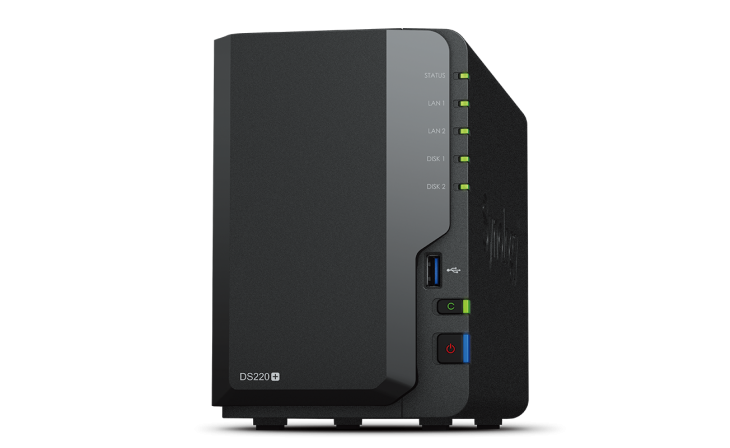Comprehensive Review of Synology DiskStation DS220+ NAS
Key Features and Design
Performance and Usability
The DS220+ is powered by a dual-core Intel Celeron J4025 processor and comes with 2GB of DDR4 RAM, which is expandable up to 6GB. This setup is sufficiently robust for home use, including 4K media transcoding, making it a valuable tool for media enthusiasts.
Storage and Expansion
This model offers two empty drive bays and supports a maximum storage capacity of 32TB, accommodating both 3.5/2.5-inch SATA HDDs and 2.5-inch SATA SSDs. The DS220+ delivers impressive transfer rates of up to 225 MB/s for reads and 192 MB/s for writes.
Connectivity and Network Features
Diverse Connectivity Options
The DS220+ includes two 1Gb LAN ports with link aggregation and two USB 3.0 ports, enhancing its connectivity and data transfer capabilities. This level of connectivity is sufficient for most home and small office setups.
Network and RAID Support
With support for various RAID types like SHR, Basic, JBOD, RAID 0, and RAID 1, the DS220+ offers flexibility in how data is stored and managed. Link aggregation capability also allows for increased network speeds and reliability.
Also Check PNY RTX 4060 Ti XLR8
Media Handling and Streaming
4K Transcoding Capabilities
A standout feature of the DS220+ is its ability to handle 4K media transcoding. This makes it an ideal NAS for streaming high-quality media content, catering to the needs of modern home entertainment setups.
Limitations and Considerations
Lack of M.2 SSD Slot for Cache
One of the notable drawbacks of the DS220+ is the absence of M.2 SSD slots for cache. This limitation means users cannot upgrade to faster, NVMe-cached storage within this model. Users requiring higher performance in this area might need to consider more expensive alternatives.
Fixed RAM and Expansion Restrictions
The pre-installed RAM on the DS220+ cannot be swapped, and the memory capacity maxes out at 6 GB, which may limit its future-proofing. Additionally, the lack of support for an expansion unit to add more storage down the line could be a constraint for users with growing data storage needs.
Software Experience and User Interface
Synology's DSM Operating System
The DS220+ runs on Synology's DSM (DiskStation Manager) operating system, known for its user-friendly interface and robust feature set. DSM offers a variety of applications and tools that enhance the NAS's functionality and user experience.
App Ecosystem and Versatility
The wide array of available apps on DSM allows users to tailor the NAS to their specific needs, whether for home media streaming, file sharing, backup solutions, or even light office work.
Price Point and Value Comparison
Affordability and Market Position
Priced at around $300, the DS220+ provides excellent value, particularly when compared to higher-priced models like the Apple MacBook Pro 14. Its cost-effectiveness makes it an attractive option for entry-level NAS users or those on a budget.
Comparison with Competitors
Synology DS920+ as a Higher-End Alternative
For users seeking more capacity and features, Synology’s DS920+ is a viable alternative. This 4-bay NAS supports up to 64TB of storage, 2 NVMe SSDs for cache, and a total of 9 drives with a separate expansion unit. It features a quad-core Intel Celeron J4125 processor and 4GB of DDR4 RAM, expandable up to 8GB.
QNAP TS-453D-4G: A Versatile Competitor
The QNAP TS-453D-4G, priced at $400, offers similar hardware specifications to the DS920+ but includes an HDMI port. It is a strong contender for users who want direct NAS-to-TV connectivity or a slightly lower price point.
Pre-configured Options with Seagate IronWolf Drives
For users preferring a pre-configured solution, the QNAP TS-453D-4G is available for $720 with four 4TB Seagate IronWolf drives, set up in RAID-5 for a total of 12TB of storage. This configuration offers data immunity to the failure of any single drive.
Conclusion: Assessing the DS220+ as a Home NAS Solution
Ideal for Home and Small Office Use
The Synology DS220+ emerges as a top pick in the Home NAS category, balancing performance, features, and price. While it may have some limitations in terms of memory and expansion, its strengths in software, connectivity, and media handling make it a compelling choice.
Navigating Trade-offs and Priorities
Users considering the DS220+ should weigh its limitations against its strengths. For those prioritizing high-resolution media streaming, versatile software, and a balance of performance and cost, the DS220+ stands out as an excellent choice.




